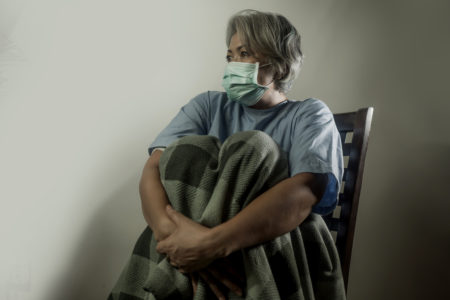
Share On Social!
COVID-19 has been a force in our lives for the last 10 months.
At this point, we know the standard procedures for safety precautions, like wearing a mask, keeping physical distance, and avoiding crowded public spaces.
We’ve even started administering a vaccine to healthcare workers and the elderly, with the FDA emergency-use authorization of the Pfizer-BioNTech vaccine this past weekend.
But despite all this, the pandemic still isn’t over.
COVID-19 cases are spiking in many areas across the country as people move events indoors due to colder weather and are travelling more for the holidays. Not to mention pandemic fatigue.
Another big safety concern is using “system justification” to ignore safety precautions.
This happens when people rationalize unsafe behaviors (like refusing to wear a mask and gathering in public spaces indoors) because it better fits their worldview and beliefs. They mistakenly think that the virus isn’t a serious problem, so they won’t take the necessary steps to address it.
Unfortunately, engaging in unsafe behaviors and ignoring safety precautions will lead to an uptick in COVID-19 cases, which disproportionately harms Latinos.
We must learn what system justification is and seek to avoid it so that we can keep the virus at bay until a COVID-19 vaccine is available for everyone.
What is System Justification?
System justification is a social psychology theory that states people will rationalize whatever the status quo is. They believe the social, economic, and political systems must be fair and advantageous, otherwise they would not be in place.
“System justification is a ‘potentially strong motivator of human behavior because it addresses fundamental human needs to reduce uncertainty, threat, and social discord,’ and can make people feel better, happier and more satisfied with the status quo on an emotional level,” according to a Salud America! research review.
But unfortunately, it can also stop progress from happening in social justice movements.
We see many socio-economic examples of this, such as with the income and wealth gap and racial/ethnic disparities in health, education, and more.
“‘System justification’ theorists like psychologist John Jost have shown how situations that represent a perceived threat to established systems trigger inflexible thinking,” reports Adrian Bardon in Scientific American.
This is particularly devastating when it comes to COVID-19.

“There is a marked gap in expressed concern over the coronavirus depending on political party affiliation, apparently based in part on partisan disagreements over factual issues like the effectiveness of social distancing or the actual COVID-19 death rate,” Barden wrote.
When people base their opinions on COVID-19 through identity and politics rather than science, it will lead to disagreements on how to best reduce the spread of the virus.
How is System Justification Linked to Identity?
System justification is tied to identity because it takes more than just presenting someone with the facts to change their worldview.
“In theory, resolving factual disputes should be relatively easy: Just present strong evidence, or evidence of a strong expert consensus. But things don’t work that way when scientific advice presents a picture that threatens someone’s perceived interests or ideological worldview. In practice, it turns out that one’s political, religious or ethnic identity quite effectively predicts one’s willingness to accept expertise on any given politicized issue,” wrote Bardon, according to Scientific American.
In fact, it can be impossible to separate our responses and beliefs from our identity.
“Human cognition is inseparable from the unconscious emotional responses that go with it. Under the right conditions, universal human traits like in-group favoritism, existential anxiety and a desire for stability and control combine into a toxic, system-justifying identity politics,” Bardon wrote.
Examples of System Justification in the COVID-19 Pandemic
There are several ways that people might express beliefs that don’t follow scientific guidelines because they better fit their beliefs.
Here are some examples of what someone might say:
- The current safety measures in my city must be enough, so I don’t have to practice being safe myself.
- Nobody I know has gotten sick, so I don’t even think the virus is real. I don’t need to wear a mask.
- The COVID-19 spike has to get worse before it gets better, so there’s nothing we can do.
- It’s that person’s fault if they got COVID-19, because our city is doing the best it can to fight it.
- My city hasn’t banned crowded public gatherings, so it must be safe, otherwise they would tell me it isn’t.
Who Does System Justification Harm?
System justification can be dangerous if it leads to a higher spread of COVID-19.
Engaging in unsafe behaviors results in the harm of Latino communities and other communities of color that have been disproportionately affected by COVID-19.
Not only are Latinos 3 times as likely as white people to be diagnosed with COVID-19, but they also comprise 43.2% of COVID-19-related deaths among the 0-24 age range, according to data from the CDC.

Latinos also have higher rates of diabetes and cancer compared to the overall U.S. population, meaning that they are likely to have pre-existing conditions that make the impact of COVID-19 much more serious than other groups.
This means that if you refuse to take safety precautions, it could mean life or death for others.
That’s why we must stay vigilant against COVID-19.
How to Avoid System Justification
System justification is difficult to address, because it involves confronting how people’s beliefs are tightly bound to their identities.
The main way we can tackle system justification is through effective communication.
“Effective communication allows individuals to voice their points of view without attacking another’s views, and without feeling attacked,” according to a Salud America! research review.
If you have an opportunity to openly address someone’s unsafe behavior regarding COVID-19 precautions, you should do so in a way that allows them to openly speak without fear of being reprimanded.
Effective communication must also come from trusted health authorities.
“Effective science communication is critically important because of the profound effects partisan messaging can have on public attitudes,” wrote Bardon, according to Scientific American.
If you can connect with people and present them unbiased, factual scientific information in a way that doesn’t make them feel attacked, it will work best.
If you need a resource for the important facts and information about COVID-19, check out our “Juntos, We Can Stop COVID-19” digital communication campaign.
Salud America! at UT Health San Antonio launched “Juntos, We Can Stop COVID-19” to help Latino families and workers take action to slow the spread of coronavirus.
The #JuntosStopCovid campaign features bilingual, culturally relevant fact sheets, infographics, and video role model stories to encourage Latinos to change their public health behaviors.
Share the campaign with your friends, family, and colleagues!
Explore More:
Overcoming Harmful BiasesBy The Numbers
3
Big Excuses
people use to justify discriminatory behavior



